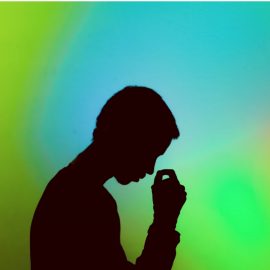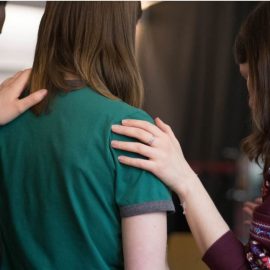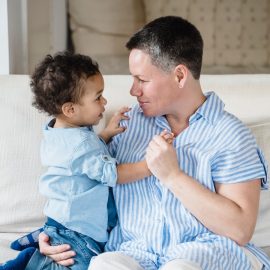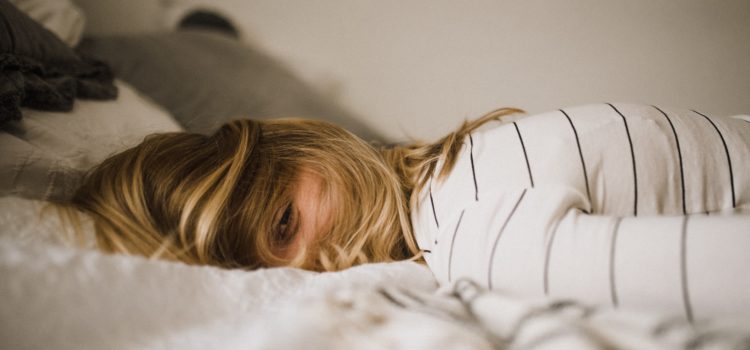
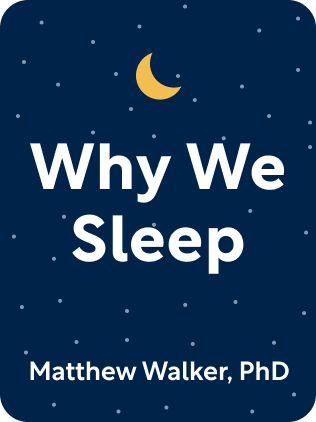
This article is an excerpt from the Shortform summary of "Why We Sleep" by Matthew Walker. Shortform has the world's best summaries of books you should be reading.
Like this article? Sign up for a free trial here .
Do you often find yourself up late at night wondering why you can’t fall asleep? What helps insomnia?
Many people suffer from insomnia each year and reach for solutions as to what helps insomnia. Below is an overview of insomnia, and some ideas about what to do when you have insomnia. Remember, before pursuing any treatment, you should consult with a doctor.
What Helps Insomnia?
Insomnia is defined as making enough time for sleeping, but having insufficient sleep quantity or quality, for more than 3 months. Symptoms include difficulty falling asleep, waking up in the middle of night, and feeling unrefreshed in the morning.
When they do sleep, insomniacs have more fragmented REM sleep and shallower brainwaves in NREM. But what helps insomnia? First, let’s go over why people have insomnia.
1 out of 9 people suffer from insomnia. It’s twice as common in women than men, and more common in blacks/Hispanics than whites, for unknown reasons.
The most common triggers of insomnia are emotional concerns or distress. The biological cause is linked to an overactive sympathetic nervous system, which raises body temperature and levels of cortisol/epinephrine. In turn, the thalamus, hippocampus, and amygdala all remain more active than in normal sleeping patients
Given the complex physiology of insomnia, it’s unlikely blunt instruments like sleeping pills will fix the root cause. So in that case, what helps insomnia?
How do you know if you have a sleep deficit? Here are a few signs:
- You don’t wake up naturally at the time you set your alarm – this means your body wants more sleep.
- When you read, you often lose track and need to read a sentence twice.
- You feel drowsy just a few hours after waking.
- You need coffee to feel functional.
Good Sleep Practices
In addition to avoiding all the problems like needed caffeine, here are a few tips that can help as you’re trying to answer the question of what helps insomnia.
- Keep the same waking and sleeping time each day. Erratic sleep schedules disrupt sleep quality.
- Practice sleep hygiene – lower bedroom temperature, reduce noise, reduce light.
- No alcohol, caffeine, exercise, or long naps before sleep.
- Exercise seems to increase total sleep time and increase quality of sleep.
- This is more a chronic effect. This does not seem to act immediately on a day-to-day scale – exercise on one day doesn’t necessarily lead to better sleep that night. But worse sleep on one night does lead to worse exercise the following day.
- Eat a normal diet (not severe caloric restriction of below 800 calories per day). Avoid very high carb diets (>70% of calories) since this decreases NREM and increases awakenings.
Is CBT What Helps Insomnia?
So what to do when you have insomnia? Doctors and researchers have been trying to figure out what helps insomnia for years. Cognitive behavioral therapy (CBT) is a common non-pharmacological method for changing behavior. It’s commonly applied to depression, but there are variants for insomnia.
CBT has been shown to be more effective than sleeping pills.
A big part of alleviating insomnia is redeveloping confidence around ability to sleep. Thus, some practices force insomniacs to restrict their time in bed, maybe even to 6 hours or less. This builds up stronger sleep pressure, and so patients fall asleep faster and regain psychological confidence.
What helps insomnia other than CBT? Other prescriptions include:
- Don’t have a clock nearby or you’ll watch the clock and be anxious that you’re not falling asleep.
- If unable to sleep, get out of bed and go back when sleepy. Don’t lie in bed awake
- Go to bed only when you’re sleepy.
- Avoid daytime napping.
- Reduce anxiety-provoking thoughts before bed.
Improving Sleep in Society
We’ve seen chronic sleep deprivation caused by a variety of factors, from the individual scaling up to the societal. This asks the question: what to do when you have insomnia when it’s not your fault?
- Individual
- Automated “internet of things” household that can automatically sense your circadian rhythm and personalize the temperature and lighting to maximize sleep.
- Furthermore, if you have an upcoming disruption to your sleep schedule (like a flight), it can adjust your circadian rhythm to smoothen the transition.
- Sophisticated body trackers that record a host of factors — sleep, physical activity, light exposure, temperature, heart rate, mood, happiness, social performance, productivity — and shows how your sleep correlates with better performance on all dimensions
- Patients given tools to show their compliance with a program (like blood pressure monitors, scales) increase compliance rates. More data on sleep would improve sleep quality.
- Can also predict when it’s best to get a flu shot (since sleep affects responsiveness to vaccines)
- Cars that sense sleepy driving through facial recognition and driving behavior. The car can shut down in dangerous situations. Drivers with good sleep habits may get lower insurance rates.
- Automated “internet of things” household that can automatically sense your circadian rhythm and personalize the temperature and lighting to maximize sleep.
- Educational
- Have sleep be a mandatory subject in physical education (like drugs and diet)
- Have predictive tools that show the costs to health and income if you continue your poor sleep habits
- Instruct the populace on sleepy driving as much as drunk driving
- Organizational
- Companies should be more flexible about work hours, allow naps, and de-emphasize hours worked in favor of real productivity.
- Employers and insurance companies can incentivize sleep. For example, for a certain number of days of over 7 hours of sleep (as tracked by a sleep monitor), get extra vacation days, more pay, or reductions in health insurance premiums.
- Hospitals should promote sleep hygiene for patients, especially in the ICU and NICU. Change the harsh white lighting, dispense earplugs and eye masks, reduce alarms and beeps, and schedule lab tests to align better with sleep schedule.
- Better sleep is shown to reduce sensitivity to pain, and increase weight gain and O2 sat levels in neonates.
Now you have an idea of what helps insomnia. You can try to practice better sleep habits, or look into other treatments that may alleviate your insomnia with your doctor.

———End of Preview———
Like what you just read? Read the rest of the world's best summary of Matthew Walker's "Why We Sleep" at Shortform .
Here's what you'll find in our full Why We Sleep summary :
- Why you need way more sleep than you're currently getting
- How your brain rejuvenates itself during sleep, and why nothing can substitute for sleep
- The 11-item checklist to get more restful sleep today




